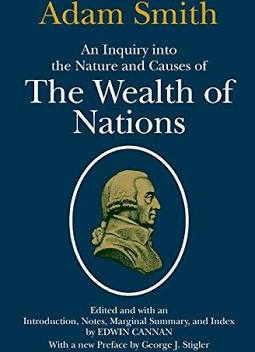For centuries, the main issue that occupied thinkers delving into economics was the question of justice. They wanted to create a just system of economic life and that is a question that comes often in the thought of classical thinkers until the 1500s.
Aristotle might be one of the earliest thinkers who offered answers to the question of just economic exchange. The Socratic writers admired the Spartan society structured along military lines, with communal property, and dependent on conquest for survival. Plato associated the occurrence of war with private property. Aristotle, however, saw it in the opposite way. Private property brings about peace, but when everything is everybody’s there is strife, jealousy, distribution problems, scarcity, and war.
For long, the question of just exchange remained the great preoccupation and the main response was that the economy is a zero-sum game—if I win, you lose. This response remains common among socialists who tell us things such as “The United States is rich because the third world is poor.” Aristotle was correct on private property, but his view of the value of exchange was another story. He believed that economic exchange was just only if the objective value of the items exchanged was the same. But that never happens. When I pay one dollar for a piece of candy, it is because I value the candy more than my dollar. If not, I’d keep my money. It is my own valuation of the item in question, not some objective, predetermined value, that matters. Aristotle—as Marx and many socialists throughout history—missed the subjective value of commodities.

Aristotle saw commerce in two ways. One was natural. Natural exchange is akin to bartering for what we need. If I need bananas and you need rice, we trade to meet those needs—the value of the exchange is exhausted by the need. The other is commerce for gain or chrematistic exchange. I buy something at a low price where it is abundant to sell it at a higher price and make a profit where the item is scarce. Another question entertained by Aristotle and the ancients were usury—charging interest on loans. Aristotle, and many thinkers after him, found it unjust precisely because they saw value as objective and exhausted in the exchange. They had not yet discovered what Hernando de Soto calls the “mystery of capital.”
As important as the question of justice is exchange was, and is, we can see that the economic thinking arising from the classical responses was weak, even if the principles of justice based on that weak economic thinking might have been accurate. Scarcity, poverty, want, and misery dominated the thousands of years during which economic thought saw exchange in such a narrow and collectivist fashion. If that is the way the economy is conceived, then individual dreams and hopes remain unfulfilled and risk and entrepreneurial drive disappear.
For hundreds of years after Aristotle, there was not much change in the views of the economy and a steady-state of poverty around the world. Even when we go all the way to St. Thomas Aquinas in the thirteenth century, we see no meaningful progress. Aquinas re-examines the questions raised by Aristotle and the Socratic writers and arrives at more or less the same answers.
However, research on certain scholastic authors has shown that some late medieval thinkers began to offer new answers. A good friend of mine, Alex Chafuen, is one of the scholars who taught us that the scholastic School of Salamanca in Spain began to give us important insights. The theory of subjective value was presented by Diego de Covarrubias hundreds of years before Jevons and Menger. Luis Saravia denied that the price of commodities is established by the costs of production. Other important authors were Juan de Lugo, Juan de Mariana, Castillo de Bobadilla, Luís de Molina, Martín de Azpilcueta, and others.[1] The early stages of free-market ideas were first developed in the sixteenth and seventeenth century by a group of Catholic theologians and philosophers, and not in the eighteenth century by figures such as Adam Smith and David Ricardo.
From the sixteenth to the eighteenth centuries, in addition to the School of Salamanca, we see some authors gaining interest in the economic question. No major authors arise but a number of pamphlets show two schools: the mercantilist school supporting greater state intervention in the economy, and the Physiocrats, wanting less. There was much debate but not a sophisticated and systematic theoretical framework. Nation-states and monarchies develop and they see the accumulation of gold and other precious metals as the way to make the kingdom wealthy. Kings such as Henry VIII in Great Britain and Louis the XI in France are counseled to reduce imports and favor enterprises that can sell products to others in exchange for gold. Notice how the economic question is shifting from questions of justice to practical questions of policy and politics.
Amid monarchical protectionism and interventionism rises a group of people who challenge the mercantilist economic system, the Physiocrats. Men like François Quesnay, Richard Cantillon, and the Marquis de Mirabeau. The Physiocrats were a group of mostly French economists who believed that the wealth of nations was derived solely from agriculture. The term Physiocracy itself translates as “the rule of nature.” The Physiocrats offered the first well developed theory of economics and preceded the first modern school we refer to as classical economics, which began with Adam Smith’s The Wealth of Nations in 1776. They compared the economy to the free flow of blood in a human circulatory system and proposed to dismantle the protectionist policies of mercantilism in favor of laissez faire.

Adam Smith references Cantillon often in his Wealth of Nations. We can say that this book separates economic thought as an independent science. Smith saw the economy as a spontaneous order, a reality that is not a social construct but is manifested through the action of individuals in areas such as language, the family, money, law, prices, and the economy itself. He is not the only one to hold such views; other major spokesmen were John Stewart Mill, Jean-Baptiste Say, Frédéric Bastiat, and David Ricardo.
Probably the greatest contribution of these authors is that of analyzing the economy as a distinct phenomenon and changing the question from a moral question of justice to a practical question of efficiency by developing an optimistic theory of human progress. Men are not destined to abject poverty, and human creativity and human labor can expand the possibilities of a better economic life for everyone to unimagined heights.
I believe that these men, with all their faults and mistakes, redeemed the idea of competition and profit. There is nothing wrong with competing with others to beat them in the task of meeting human needs and wants. There is nothing wrong with being greatly remunerated for that effort. Through trial and error and the right incentives, men learn what works best and, in the process, become more efficient—and everyone becomes more prosperous. Aristotle was mistaken in thinking that profit was unjust. The great Aquinas was mistaken in thinking that if any profit was brought about from economic exchange, the only moral destination for it was the church.
Now, the classical thinkers were still captive to an erroneous theory of labor. Their Theory of the Value of Labor still saw prices as arising from the costs of production, just as Aristotle and many others for centuries seemed to have taken for granted. If the price of making a chair, for example, is determined by the costs of production, then it is objective. But the costs of production are also prices. For example, the wood to make the chair has a cost, the tree has a cost, the seeds have costs, and so on. They could not fully explain prices and seemed to be engaged in circular reasoning. It is this theory of labor that Karl Marx utilizes and criticizes in his first volume of Das Kapital.
It took a while, but in 1871 three authors finally developed the idea of marginal utility. Carl Menger in Austria, Stanley Jevons in England, and Leon Walras in Switzerland discovered the principle of subjective value and marginal utility.[2]For something to be an economic good, it must be scarce and of utility to people. A businessman is going to try to sell something at the highest price possible but that will depend on whether people are willing to pay the price the seller asks for. If his price is too high, he might not sell it and competitors might use the occasion to offer the item at a lower cost, taking him out of business.
This extremely short look at history misses more than what it captures, but it might give us a glimpse at the history of the economy and the importance of ideas. We interpret the facts of history in view of a theoretical framework, a prism through which we filter reality. If the theoretical framework is incorrect—as it was with Karl Marx’s—we will read the empirical facts incorrectly. But it was the change of the questions regarding economic life that caused men to look at the same empirical facts with renewed interest and caused great advancement in the economic affairs of men.
[1] Chafuen, Alex, Faith and Liberty: The Economic Thought of the Great Scholastics (MD: Lexington Books, 2003).
[2] A number of schools or currents of marginalism developed from these three thinkers, one being the Austrian school, another the mathematical school of Alfred Marshall, and from that school other currents such as Monetarism and Keynesianism.


